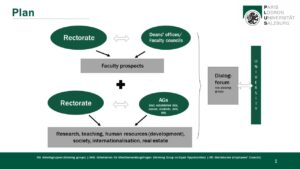The Rector’s Column: development plan
The Rector’s Column | 25.10.2022
Dear employees, colleagues and students,
The development plan is – as the name suggests – one of Austrian universities’ central planning and steering instruments. One basis for the development plans is the General Austrian University Development Plan (GUEP), in which the so-called system goals are defined, which concern the basic design of the Austrian university landscape. Secondly, paragraph 13 b of the Universities Act (UG 2002) stipulates exactly how a development plan must be structured: it shall be aligned with the structure of the performance agreement (LV) and cover two three-year performance agreement periods; the upcoming period in detail and the period after it in outline. The upcoming development plan of the PLUS, which is in preparation, will cover the period from 2025 to 2030 – and thus the LV periods 2025-2027 and 2028-2030.
When the – then new – rectorate took office under my leadership in 2019, the preparation of the development plan was a task we had to face immediately. Looking back, this process was very stringent but, and largely due to the pandemic and time constraints, it was also not always as participatory as we would have liked. The current work in and with the steering group as part of the change management process means that we will take a more alternative approach to drafting the development plan this time and will continue to use the dialogue forum format established in the change management process. In addition to the deans’ offices – this of course also includes the faculty councils – and the steering group, various working groups (AGs) will deal with the core content topics of the development plan, naturally also with the students’ active involvement. The AGs will be responsible for identifying and preparing essential issues for the PLUS that will feature in the development plan. In line with the previous development plan, these will primarily be the topics of teaching, research, human resources development, social responsibility, internationalisation and infrastructure. The results of the AGs’ work will then be presented at a dialogue forum and discussed and further developed with the participation of all university employees. In this way, all employees can actively participate.
The steering group will act as a “sounding board” as usual, taking up the topics from the AGs, but also from the entire university, and preparing, structuring and conducting the dialogue forum for the development plan. The establishment of the AGs is currently in preparation and should be completed by December at the latest, so that the AGs can begin their work as soon as the guidelines for the development plans are published by the Ministry (probably in December 2022). The dialogue forum on the development plan will most likely take place at the end of February. We have also summarised this process for you in a graphic overview:

The draft of the development plan must be sent to the Senate as early as June 2023, so that the Senate has sufficient time to discuss it and prepare a statement to the Rectorate before it is sent in a revised form to the University Council for a decision and can then be submitted to the Ministry. The draft of the development plan must be sent to the Senate as early as June 2023, so that the Senate has sufficient time to discuss it and prepare a statement to the Rectorate before it is sent in a revised form to the University Council for a decision and can then be submitted to the Ministry.
So, as you can see, we don’t have much time to work out the development plan this time either. Nevertheless, it is particularly important to us to establish a broad participation process so that all employees, but of course also and especially the students, feel seen and heard and, above all, are reflected in the development plan. We are currently confronted with major challenges that we will only overcome if we all pull together in the interest of the (further) development of the PLUS!
I would like to thank you in advance for your participation and support!
Kind regards,
Your Rector
Hendrik Lehnert
Image: © University of Salzburg. PLUS




